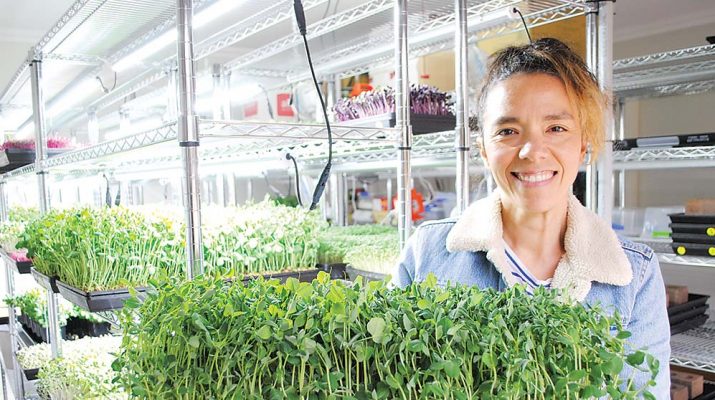By Stefan Bradley
Operating out of her garage, Gippsland Microgreens Farming founder Kathleen Murphy says the biggest challenge facing her Briagolong-based, family owned business, is that many people don’t know much about microgreens.
Ms Murphy, who previously worked in a health shop, started the microgreens producing business in July last year with her partner, Eden Barberio, a rouseabout working offshore.
“We’ve been vegan plant-based eaters for nearly seven years now, so we’ve always grown microgreens and sprouts on our window as a hobby, because it’s nutritionally dense,” Ms Murphy told Gippsland Farmer.
“During COVID, we wanted to run a business that not only helps people, but can provide for us as a family as well. So Eden asked why don’t we look into microgreens?
“We did research and a course on microgreens to get more knowledge on how to grow them, the costs and its benefits. The passion was already there, so we had to make sure that financially it could sustain us. Which it can! So we grow about eight microgreens now.”
The garage houses microgreens such as pea shoots, red Russian kale, wheatgrass, sunflowers, broccoli, purple radish, rocket and amaranth.
“It’s been an interesting time to start with all the COVID lockdowns that were occurring last year,” Ms Murphy said.
“We’re finding that people don’t know a lot about microgreens, so we’ve been educating them. Basically, microgreens are small versions of their mature counterparts. So broccoli microgreens are the same as (mature) broccoli, but the microgreen ones are more nutrient-dense.
“And I think the flavour of the microgreen rocket is much more intense than the regular rocket.
“For some people, microgreens are just a salad addition to their food, but you can actually add it to smoothies, soups, curries, sushi and pastas, as with the mature vegetable counterpart.
Microgreens are more than just a garnish.”
Ms Murphy said the goal is to eventually take the microgreens out of the garage and into a shed.
“We’d either have it outdoors with natural sunlight or keep doing what we’re doing with the lights inside. We’re looking at selling seedlings as well.”
Ms Murphy has also been running plant-based cooking classes.
“I recently showed people how to make a microgreens pesto. There’s so much flavour in the pesto, and it’s quick and easy,” she said.
“A lot of people are sending me recipes or photos of the dishes they’ve been making, so the feedback has been really good. Locals in Gippsland are very supportive and give a lot of encouragement.”
Unlike for many fruit and vegetables producers, Gippsland Microgreens Farming do not require increasingly more expensive fertiliser to grow their product, and the price of soil and seeds have not soared.
However, higher electricity prices, inflation and fuel prices have made an impact.
“We have to be smarter with our deliveries because we do a lot of kilometres. I go from here (Briagolong) to somewhere like Warragul in a day. That’s a lot of driving,” Ms Murphy said.

